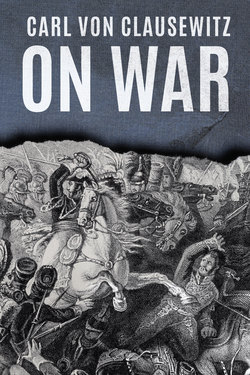Читать книгу On War - Carl von Clausewitz - Страница 32
На сайте Литреса книга снята с продажи.
CHAPTER II. Ends and Means in War
ОглавлениеHaving in the foregoing chapter ascertained the complicated and variable nature of War, we shall now occupy ourselves in examining into the influence which this nature has upon the end and means in War.
If we ask, first of all, for the object upon which the whole effort of War is to be directed, in order that it may suffice for the attainment of the political object, we shall find that it is just as variable as are the political object and the particular circumstances of the War.
If, in the next place, we keep once more to the pure conception of War, then we must say that the political object properly lies out of its province, for if War is an act of violence to compel the enemy to fulfil our will, then in every case all depends on our overthrowing the enemy, that is, disarming him, and on that alone. This object, developed from abstract conceptions, but which is also the one aimed at in a great many cases in reality, we shall, in the first place, examine in this reality.
In connection with the plan of a campaign we shall hereafter examine more closely into the meaning of disarming a nation, but here we must at once draw a distinction between three things, which, as three general objects, comprise everything else within them. They are the military power, the country, and the will of the enemy.
The military power must be destroyed, that is, reduced to such a state as not to be able to prosecute the War. This is the sense in which we wish to be understood hereafter, whenever we use the expression “destruction of the enemy’s military power.” The country must be conquered, for out of the country a new military force may be formed.
But even when both these things are done, still the War, that is, the hostile feeling and action of hostile agencies, cannot be considered as at an end as long as the will of the enemy is not subdued also; that is, its Government and its Allies must be forced into signing a peace, or the people into submission; for whilst we are in full occupation of the country, the War may break out afresh, either in the interior or through assistance given by Allies. No doubt, this may also take place after a peace, but that shows nothing more than that every War does not carry in itself the elements for a complete decision and final settlement.
But even if this is the case, still with the conclusion of peace a number of sparks are always extinguished which would have smouldered on quietly, and the excitement of the passions abates, because all those
